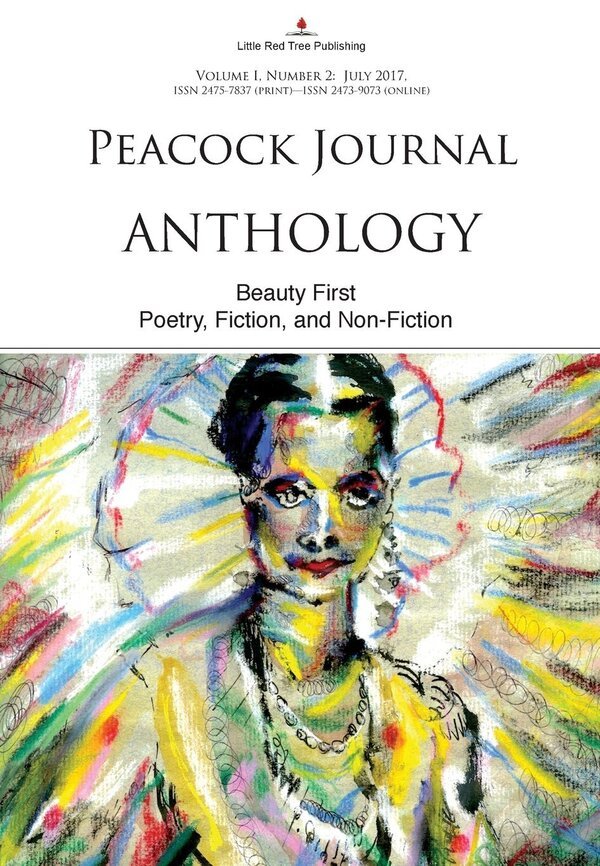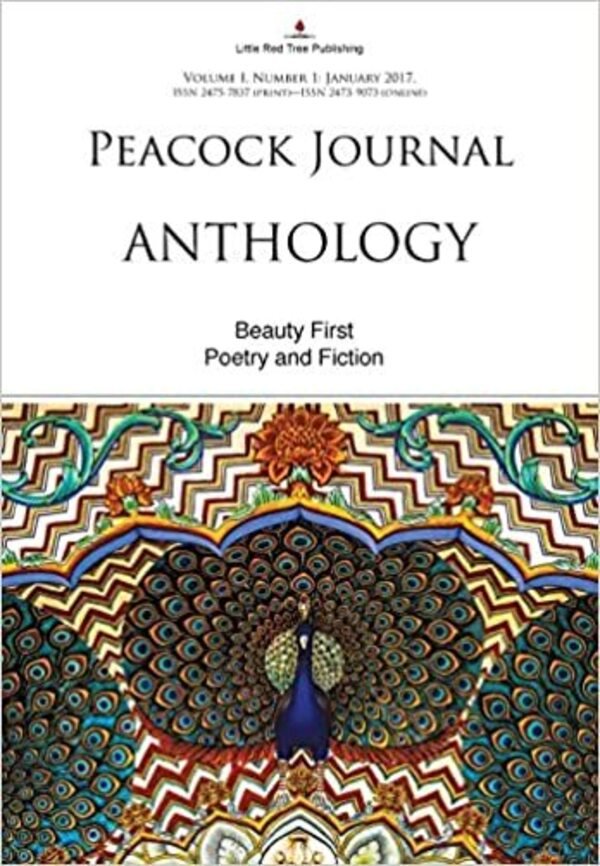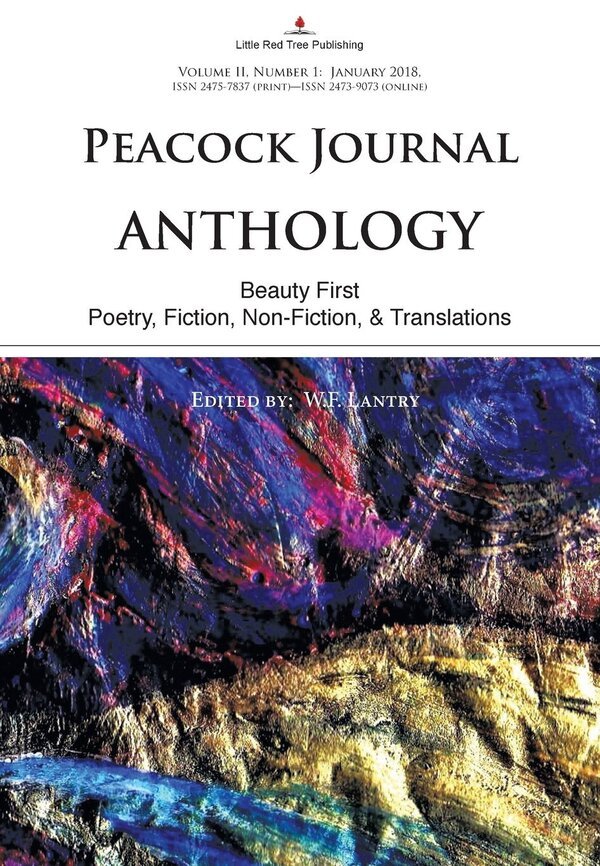Peacock Journal – Anthology: Beauty First [Volume II, Number 1]
Edited by W.F Lantry
($9.95. (7 & 10), Paperback, 118 pages, 70 b&w photographs)
CONTRIBUTORS—POEMS, FICTION, NON-FICTION AND TRANSLATIONS
POETRY
Inna Dulchevsky : “For Him and His Heaven”
Donelle Dreese : “Earth Mothers”
Steven Ostrowski : “This is How We’ll Change the World”
Charles Wyatt : “A Place to Listen”
Diana Dinverno : “Gladioli”
Sarah Anna Paden : “I Write With My Seatbelt on”
Yu-Han Chao : “Xmas”
Lori Desrosiers : “Words Are Not Enough”
Susan Spear : “Vespers”
Sanjeev Sethi : “Consubstantiality”
Mark J. Mitchell : “The Bridge is a Cage”
Tree Riesener : “reveilles”
Judy Katz-Levine : “An Answer to a Question Just Posed on ‘Cabala'””
Tejan Green : “Picking Up”
Jared Carter : “Violoncello”
Libby Maxey : “Homecoming”
Tricia Knoll : “The Witness of Rings”
Maximilian Heinegg : “Small Gathering”
Carol Barrett : “Guest”
Ruth Asch : “Jasmine”
Wren Tuatha : “Emperor of Nimshew”
Brook Bhagat : “There is a Mother Waiting For You, a Kangaroo”
Kalpna Singh-Chitnis : “Contemplation on Seasons”
Elizabeth Burk : “Portal”
Susan Tepper : “Still Water”
Yuan Changming : “Muted Melody of Mountains”
Al Simmons : “Conversation with a Dove”
Diana Raab : “Fast Moving Brain”
Carolyn Martin : “A Novice’s Confession: 1964”
Anya Silver : “Late Summer”
Sanjida Yasmin : “September 6th”
Anwer Ghani : “The Ocean’s Mirrors”
Andrea Potos : “Notes From Italy”
Jane Andrews : “Second Harvest”
Diane Lee Moomey : “Black Friday at the Ocean”
Tim Kahl : “A Ready Stone”
Maria Rouphail : “Road and Trees”
Lavinia Kumar : “While Church Bells are Ringing”
Christien Gholson : “Black Madonna’s Cave: Rocamadour”
Kate Garrett : “The Perfumier”
Lana Faith Call : “A Word Like Wire”
Don Zirilli : “One Spring”
Margaret Rozga : “River Breadth
FICTION
LaShonda Katrice Barnett : “July’s Jonquils”
Sandra Arnold : “Heartbeats”
Joseph Baran : “The Last Letter”
Beate Sigriddaughter : “A Painting Inside a Painting”
Clara Burghelea : “When Tom and Jerry Met Julius Meinl”
Sandhya Acharya : “Beautiful Eyes”
Donna Mulvenna : “Freedom to Roam”
Emily Williamson : “Solberg Airport”
Lynn B. Connor : “The Peacock on Top of the Christmas Tree”
Foster Trecost : “Bridges Are a Lot Like Long Corridors”
Kevin Davila : “Nirvana”
A. Kathleen Collins : “By the Hand of a Bygone Love”
NON-FICTION
Sara Martin : “Coquinas”
Brandi Jo Nyberg : “Seneca ROCKS”
Elizabeth Jaeger : “Mattituck: 1980”
Bertram Allan Mullin : “Zoinks”
TRANSLATIONS
Christopher Childers : “Translation from Propertius: 2.29”
Jonathan Simkins : “Translation of Ernesto Noboa y Caamaño: The Danaides”
INTRODUCTION
So it was quiet, and oddly warm. All was peaceful: The still air, the walls, even the darkness disturbed only by the sounds of my long, slow breathing. Such is the nature of hibernation. Coleridge knew this as well:
Oh sleep! it is a gentle thing,
Beloved from pole to pole!
To Mary Queen the praise be given!
She sent the gentle sleep from Heaven,
That slid into my soul.
Then I became vaguely aware of a disturbance somewhere outside the door of the bear cave. A pounding on the door. As I began to wake up, the pounding grew more intense. It seemed, to my languid mind, like the sound of cast iron striking weathered oak. As the door began to yield, a few clumps of snow blew in on the first icy drafts and the light could have blinded a minor visionary.
The door swung open, admitting everything, and standing in the doorway was Kate. She did not look pleased, in fact she looked slightly disgruntled. In this occurrence, she was shouting. I suppose one does need to shout to rouse a hibernating bear. Even still, one would think a veneer of dignity could be maintained. But no, she was clearly of a contrary opinion.
“Get up, you old fat lazy slob! There’s writing to be done!”
I would have been perfectly within my lethargic rights to have been grumpy. Instead, I smiled at her. That’s when she smacked me on the shoulder, saying “Bourge-toi les fesses, espèce d’ours paresseux!” When she breaks out her Ivy League French, it’s time to listen. Besides, her accent is way better than mine. I blinked in the light.
“Darling, it’s three degrees outside, with a windchill of minus 17. If I can’t migrate South, the only rational alternative is hibernation.”
“Get up, California. You do not live in paradise anymore!”
Ain’t that the truth? If you must know, Kate is from the frozen North, and untroubled by snow and ice. I myself once witnessed her drive through a two-foot deep blizzard. I staggered down a drifted hill to meet her at a crossroads. She was calmly brushing snow off her car, wearing a knee-length sapphire coat.
“You were beautiful that day, Darling. Almost as beautiful as you are this morning!”
“This is not the time for gratuitous flattery, William. We need an introduction to the first issue of the second volume of the Peacock Journal Anthology!”
By this time, I was at least fifty percent awake, and knew there’d be no quick return to my dreamy hibernation. I staggered over to my keyboard, saying, “What should I write?”
“How should I know? You’re the wordsmith. Fire up the diction forge, and say something about the poets and writers and artists in the anthology…”
“But it’s hard to know where to start. We have hundreds of thousand of page views, from a hundred and sixty-two countries. We must have contributors from five or six-dozen different countries. Maybe I could start: “Three-score and twelve contributors ago, our…”
“William, you’re so derivative. Talk about individuals.”
“Well, geographically, our most distant contributor is a novelist from New Zealand. But we also have a poet form China, a short story writer from Bengal, people from all over Europe and Africa and the Middle East, and Eco-Non-Fiction from the Amazon Basin. There’s a poet from Taiwan, and another who works in Mumbai. We have a young writer from Nicaragua with his first publication, Canadians, and at this point we must have at least one contribution from each of the fifty states. We even have a contributor who herds goats in the foothills of the northern Sierras. I love that! And our publisher is a British gentleman who used to work from Connecticut and now lives in Nebraska, where it’s even colder than it is here!”
“So you have an embarrassment of choices. Who should you feature?”
“If I name anyone, those who aren’t named might feel sad. And I love all contributors, each in a different way. That’s the beauty of being an editor. I get to walk, for a little ways, in the company of each writer. I get to see the world through the eyes of each artist. And it’s a privilege to know, if only for a few lines, the soul of each poet.”
Maybe you should talk about a theory of Beauty. We ask all our contributors to do it, so it’s only fair.”
“Well, as a reader, I used to think it was about walking the same path. We’d go on a journey with the writer, and she’d point out this stream, that building, the distant skyline, mentioning the aspects that were beautiful to her, and their attributes. And later, on different journeys, we’d carry those understood attributes with us, until the world itself had been transformed through a thousand individual visions.”
“Wow. But what do you mean, ‘used to’?”
“Then I changed my mind. And I started to think real poetry showed us exactly what it was like to be a human being in one particular place, at one particular moment in time. That’s what Sappho’s passion and Du Fu’s exactness and Rimbaud’s vision all have in common. Sappho gets so jealous when one of her friends look at a certain person. “I was the man, I suffered, I was there.” I know exactly what it’s like to see Du Fu’s geese in that misty field across the stream. And I spent most of my life seeking out Rimbaud’s Hortense, until I found her in you.”
“Aww. But you’re using the past tense again. What do you think now?”
“Well, last summer, in the midst of the sweltering—that’s exactly the right word, le mot juste, in Old High German the root means ‘burning with passion’—heat, while James and I began work on the deck, I was listening to a podcast about ancient archaeology. The lecturer had a whole episode about the caves of Lascaux. Every aesthetics class I ever took talked about these cave paintings, as they’re some of the oldest examples of Art. And there are all sorts of theories about the creatures depicted, and the hunt, and spirit-animals, and all that stuff. And there’s one place where the artist dipped her hand—people are now convinced it was a woman—in red ochre, and pressed it against the wall, tagging it, to use today’s vernacular. All the professors were in agreement that this was the ultimate act of Captial-A Art. It’s what Pound meant when he wrote:
Coracle of pacific voyages,
The unforecasted beach
Then on an oar Read this:
I was
And I no more exist;
Here drifted
An hedonist.
“The ship-wrecked voyager had carved into the oar a record of having existed, a record of passionate experience. Just like that handprint in the cave. It’s the widely accepted view, the shared convention of considered wisdom on the subject.”
“William, are you say all those experts were missing something?”
“So this lecturer argued. She said those people went into those caves on extended spiritual journeys. These journeys, these passages, became a ritual tradition. And those who came after, the new voyagers, could place their own hands against that red ochre handprint, and access the visions of the first artist. The mystical experience became transferable, through Art.”
“William, honestly…”
“I know. But get this: In the very first Introduction I ever wrote, for a journal I started all those years ago in California, I argued that poetry is ‘the literary record of visionary experience.’” You can look it up. So I’ve come all the way around. As Nietzsche said, “Time is a flat circle.” And then there’s this:
We shall not cease from exploration
And the end of all our exploring
Will be to arrive where we started
And know the place for the first time.
“You’re ending on the Four Quartets?”
“Darling, can you think of a better place?”
W.F. Lantry
Washington, DC




